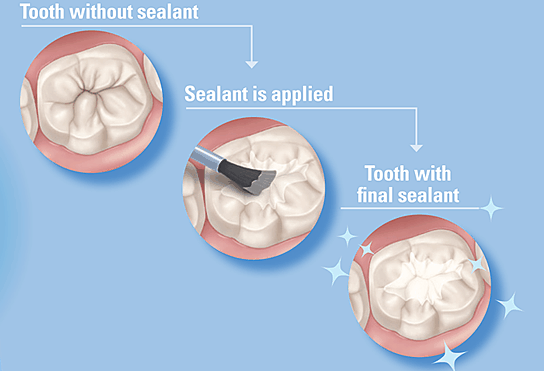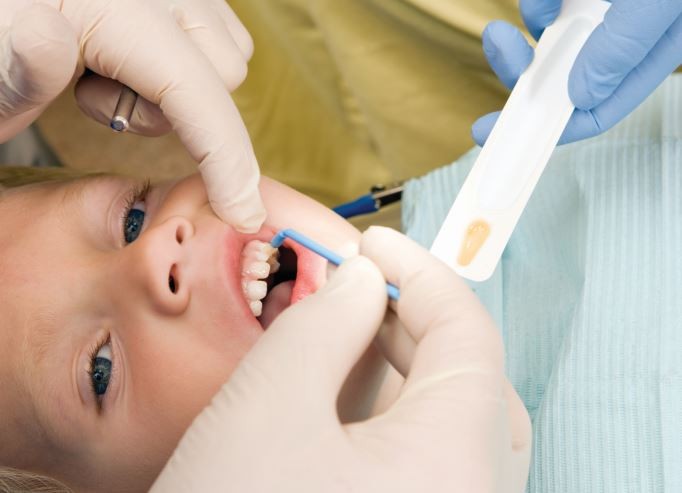COMMUNITY ORAL HEALTHCARE
Introduction
The following are programs under Community Oral Health Care that are conducted through a population approach or targeting high-risk communities/individuals:
Fluoridation of Public Water Supply Programme
School-based Fissure Sealant Programme
School-based Fluoride Mouth Rinsing Programme
Fluoride Varnish Program for Toddlers
Program for the Prevention and Early Detection of Pre-Cancer Lesions and Oral Cancer
Community Oral Health Service Program

FLOURIDATION OF PUBLIC WATER SUPPLY PROGRAMME
Fluoridation of public water supplies has been recognized by the World Health Organization (WHO) as an effective community prevention program to prevent and reduce tooth decay. Fluoridation of public water supply has been accepted as one of the government policies in Malaysia since 1972.
Since 2006, as many as 72-78% of the population in this country have benefited from this program. Wide tap water supply coverage and good cooperation between the Ministry of Health and various water authorities have been able to contribute to the success of this fluoridation program.
Fluoride level monitoring in the public water supply is carried out by the District Dental Officer. If there is a violation of the fluoride level in the water supply, the plant will be notified.

SCHOOL-BASED FISSUER SEALANT PROGRAMME
The Selan Fissure program at school is a clinical prevention program that aims to prevent dental caries in permanent teeth among school children.
Fissure Sealant is a substance that is usually placed on fissures and grooves in permanent molars to prevent caries. Fissure Sealant plays a role in caries prevention because it can protect fissures and grooves where caries often occur with minimal fluoride protection.
The Fissure Sealing Program in schools was implemented throughout the country starting in 1999. Under this program, fissure seals are placed on teeth with deep fissures/grooves for students at risk of caries.

SCHOOL-BASED FLOURIDE MOUTH RINSING PROGRAMME
The Fluoride Mouthwash Program is carried out in schools with the aim of controlling and preventing dental caries among school students, especially in areas that do not have optimal fluoride levels in the tap water supply.
Fluoride Mouthwash is a fluoridated solution used for daily or weekly mouthwash to maintain fluoride in dental plaque and saliva to help prevent dental caries.
This program involves students from year 1 to year 6 in selected schools and they are required to gargle for 1 minute every week with a 0.2% sodium fluoride solution and as many as 40 times a year for optimal effectiveness.

FLOURIDE VARNISH PROGRAM FOR TODDLERS
Fluoride Varnish application is the only topical fluoride application that is professionally applied to control and prevent dental caries among toddlers. Varnish is applied to the surface of the tooth to slow down, stop or reverse the initial process of tooth decay.
For effective caries prevention, four applications of Fluoride Varnish are recommended every 6 months. The Fluoride Varnish Program was started for toddlers to strengthen the Early Childhood Oral Healthcare Program.
In order to optimize the use of resources, this program is focused on high-risk toddlers in the community. The program is conducted in identified locations such as nurseries, maternal and child health clinics and dental clinics.

PROGRAM FOR THE PREVENTION AND EARLY DETECTION rogram for the Prevention and Early Detection of Pre-Cancer Lesions and Oral Cancer
A program for early detection and prevention of pre-cancerous lesions and oral cancer was launched in 1996 and is targeted at at-risk groups.
In 2014, in addition to screening for communities identified as high risk, emphasis was also placed on opportunistic screening for outpatients at all dental clinics and community outreach services.
The purpose of this program is to increase awareness of the risk factors that can cause oral cancer, educate individuals to detect the early signs of oral cancer symptoms (Mouth Self-Examination) and conduct screening for oral lesions and risk factors among patients aged 18 and older.
Patients with risk factors and/or oral lesions will be referred for further management.
Signs In The Mouth That Need Attention:
- Ulcers that do not heal in 2 weeks
- White or red lesions
- Lumps or thickening of oral soft tissue
- Difficulty chewing or swallowing
- Earache
- Difficulty moving the jaw or tongue
- Numbness in the tongue or other areas of the mouth

COMMUNITY ORAL HEALTH SERVICE PROGRAM
Community oral health services are conducted using clinics/laboratories/mobile dental teams. Most of the targeted communities are marginalized groups such as the elderly and disabled in institutions, Orang Asli in Peninsular Malaysia, Orang Asli in the interior of Sabah and Sarawak and also the B40 group.
Dental services are also provided at dental clinics in the Urban Transformation Center (UTC) and Rural Transformation Center (RTC) which are one-stop center that provide various services to the urban and rural communities.
In addition to providing dental health promotion and education, outreach services for the community also provide dental check-ups, oral cancer screening as well as clinical prevention, scaling, fillings, tooth extraction and denture manufacturing.

